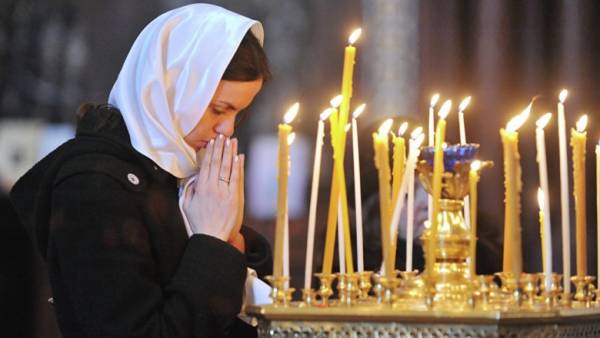Great post: five major misconceptions
MOSCOW, 19 Jul — RIA Novosti, Anton Skripunov. The Orthodox Monday lent begins. Every year it is accompanied by numerous disputes about what and what not to eat, how to dress and so on. About the main myths of the Great lent — in the material RIA Novosti.

So
Lent this year intend to comply with only 11 percent of Russians.
“Typical fasting”, according to VTSIOM, a woman older than 45 years.
The majority of Russians, according to the poll, not going in any way to limit myself.
“One in five (20 per cent) are still undecided, and 66 percent, by contrast, know that they will not limit themselves in food and actions,” say the sociologists.
Perhaps many are afraid of not so much the length, as the severity of the post.
In the first two days relies completely abandon food, and then allow yourself no more than two meals a day — so says ustav (Typicon).
However, in the Russian Orthodox Church stressed that the Typicon for laymen is only a guideline, not a strict law.
“Each has its own characteristics, and each is performing its task independently. The meaning of fasting is not to not to eat and what not to do. The point is to restore confidence to “Paradise subordination” body soul, soul and spirit. Why someone needs more strictly than written in the Statute, to fast, to someone at least. There should not be mechanical, but spiritual attitude to everything,” explains the rector of the Church of Alexander Nevsky at MGIMO Archpriest Igor Fomin.
But how to understand how to fast? Need, says the priest, to pay attention to the result.
If you do not see any change and modifications from the post, it is worth considering.Igor Fairprocura, rector of the Church of Alexander Nevsky at MGIMO
When lent ends?
The tradition of fasting before Easter arose among Christians at least in the second century. Post lasted a total of 40 hours from good Friday to Easter. A century later in some communities has fasted for six days. And in IV—V centuries, the Church declared the Great fasting is obligatory for the believers. The prototype of his forty-day sojourn of Jesus Christ in the desert before he began his sermon. This year Orthodox Christians celebrate Easter on April 8 and a Great post called “Lent” begins on February 19.
A logical question arises: why should fasting 49, not 40 days?
The fact that lent ends with Lazarus Saturday (March 31), and the next day — feast of the Entrance of the Lord into Jerusalem (palm Sunday) — starts a special, Holy week, meaning the most important for believers.
“Holy week is a special time when we day by day experience chronologically the events before Easter. But from the point of view abstinence from food and entertainment during this period 19 February-8 April — can be viewed as a single,” emphasizes the Professor of the Moscow theological Academy Archpriest Maxim Kozlov.

The main thing — without food
“Now just lent starts, so let’s go on a diet” — this overheard on the street the phrase in the midst of the carnival makes you wonder if there’s a difference between dieting and fasting.
It turns out there is substantial. Post called purposeful conscious and voluntary self-restraint, including food, said father Maxim Kozlov.
“Orthodox Christians, that goal is the achievement of Holy week and Easter in nerasbavlennom mental state. Part of this exercise, “developing muscle” — limitation and respect of food. But the food is not reduced, there are still restrictions on entertainment,” he says.